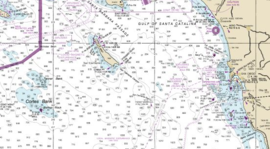| Cortes Bank | |
|---|---|
 Cortes Bank near San Diego | |
 | |
| Location | |
| Coordinates | 32°28′41″N 119°12′54″W / 32.478°N 119.215°W |
Cortes Bank is a shallow seamount (a barely submerged island) in the North Pacific Ocean off California. It is 96 miles (83 nmi; 154 km) southwest of San Pedro in Los Angeles, 111 miles (96 nmi; 179 km) west of Point Loma in San Diego, and 47 miles (41 nmi; 76 km) southwest of San Clemente Island in Los Angeles County. It is considered the outermost feature in California's Channel Islands chain. At various times during geologic history, the bank has been an island, depending on sea level rise and fall. The last time it was a substantial island was around 10,000 years ago during the last ice age. It is possible that this island was visited by the first human inhabitants of the Channel Islands, most notably San Clemente Island, whose seafaring residents would have been able to see the island from high elevations on clear days.[1]
The shallower reaches of the bank comprise about 15 to 18 miles (24 to 29 km) of sandstone and basalt, and they rise from the ocean floor from a depth of 1,000 fathoms (6,000 ft; 1,829 m), or just over 1 mile (1.6 km). The bank has been described as a series of mountaintops, but really it is more of the shape of a wave-scoured mesa with a few hard, basaltic high spots along its length. The shallowest peak, the Bishop Rock, rises to between 3 and 6 feet (0.9 and 1.8 m) from the surface, depending on the tides. On very low tides, the rock can be visible in the trough of passing waves. Other shoal spots besides the Bishop Rock also spawn giant waves. These shoals range in depth from 30 to 100 feet (9.1 to 30.5 m) and are a hazard to shipping. Nine Fathom spot is about 4.5 miles (3.9 nmi; 7.2 km) northwest of Bishop Rock and also rises to about 54 feet (16 m) below the surface. Both are noted scuba diving locations featuring clear water, vast kelp forests, and abundant sea life. Bishop Rock also creates a renowned big-wave surfing spot recognized as capable of producing some of the tallest surfable waves in the world.[2][3][4]
- ^ Porcasi; Judith and Paul (1999). "Early Holocene Coastlines of the California Bight" (PDF). Pacific Coast Archaeological Society Quarterly. 2. 35 (Spring/Summer).
- ^ Dixon, Chris (2011). Ghost Wave. San Francisco, CA: Chronicle Books. pp. 19–28. ISBN 978-0-8118-7628-5.
- ^ Holzman, J.E. (1952). "The Submarine Geology of Cortes and Tanner Banks". Journal of Sedimentary Research. 22 (2): 97–118. doi:10.1306/D42694D1-2B26-11D7-8648000102C1865D.
- ^ Raab, L. Mark; Cassidy, Jim; Howard, William J.; Fagan, Brian (2009). California Maritime Archaeology: A San Clemente Island Perspective. Lanham, MD: Alta Mira Press. ISBN 978-0759113169.